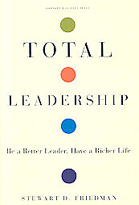Hint: It’s good career advice, too.
by Rick Telberg/On Careers
Last year I managed to break loose for a short vacation. It was all over in about 14 minutes, barely enough time to imagine swinging in a hammock under a palm tree on the beach of a small Caribbean island. But it was just enough time to think about that elusive dream of balancing work and life. Sound familiar?
Life. You remember that, right? It’s that place with the kids and the concerts and the friends sitting back in Adirondack chairs to the sounds of the tinkling of ice at twilight. Stop laughing for a minute.
 That place really does exist and Stewart Friedman (pictured), founding director of the Wharton Leadership Program and the Work/Life Integration Project, says he knows how you can get there.
That place really does exist and Stewart Friedman (pictured), founding director of the Wharton Leadership Program and the Work/Life Integration Project, says he knows how you can get there.
In his new book, “Total Leadership: Be a Better Leader, Have a Richer Life,” Friedman describes the four domains of people’s lives:
- work,
- home,
- community and
- self.
And what individuals can do to integrate these domains and improve their leadership skills at any stage in their careers.

Friedman creates a three-point compass to serve as a roadmap:
- authenticity,
- integrity and
- creativity.
The first section of the book about authenticity walks you through anecdotes and exercises to clarify your most important core values. At the same time, he draws the pictures of four interlocking circles, each representing a role in life: home, self, work and community.
Next, a section about integrity starts you thinking about all of the stakeholders in your life – at work, at home and everywhere in between. What are the expectations of the people in the various aspects of your life, and what are your expectations of them?
In the final section of the book, Friedman focuses on innovation and creativity. Innovation is easily one of the most covered topics in business books today, but Friedman suggests the notion of innovation through experimentation beyond the work role to the other aspects of one’s life: home, self and community. His exercises coach you through “small wins” in creativity on the way to bigger wins and, ultimately, change management.
In delineating the four domains of everyone’s life, Friedman says you shouldn’t try to balance them. You have to integrate them. Not only that, but the process of integrating them will improve your leadership skills. And it’ll feel good, too.
He says it doesn’t have to be a trade-off. You don’t have to sacrifice office productivity to find time to watch a Little League game. And rather than trying to avoid getting roped into community projects, you should look for ways to get involved.
How do you get out of that trade-off mentality?
Leadership.
Good leaders, Friedman says, look for ways to create sustainable change. By “leader” he means “you.” As a leader, you need to enlist people by getting them to see the benefits of cooperation. To do that, you need to understand what’s important to you and to them.
That’s something you need to talk about with them.
Another part of the process is “being whole.” That means identifying the performance expectations of the most important people in your life at work, at home, and in the community. You need to know what they expect of you so that you can know what to expect of yourself.
And, guess what? Odds are, people don’t expect as much from you as you think they do.
There’s a lot of room in that expectation gap, and in that room there’s a lot of time – time you can use to become whole, that is, to integrate work, home, community and self.
Easier said than done? Yes. Impossible? No!
It demands a lot of dialogue, two-way feedback, openness, honesty, thought, learning about other people and caring about them.
We have a word for that. Leadership.
Taking that leadership position leads you into that state of integrated wholeness. You find more satisfaction at work, at home, in the community and in yourself. And, then, even though you’re involved in more activities, you’re spending less time at the office because you’re getting more done while you’re there. When your life is better, your productivity is better.
That sounds to me like something more than leadership. It sounds like happiness.
NOW IT’S YOUR TURN: How do you balance life and work? Send your comments, ideas, rants or raves to Rick Telberg.
Copyright © 2000-2008 CPA Trendlines/BSG LLC. All Rights Reserved. First published by the AICPA.
4 Responses to “The New Strategy for Work-Life Balance”
Brenda C. Wallace, CPA
I have for years bought into the “balancing†of life between career, family, spirit, community , etc. This is first time I have seen this “integrated†concept.
I guess I need to read the book, as my first impression is if you try to integrate all these areas, you will be at a little league game talking to another parent about taxes and promoting your CPA firm, and then when you are at work you are talking to others about your family, etc. And maybe that isn’t so bad… incorporating all these aspects into the one whole person you are. But I would still want to concentrate on where the circles don’t overlap… sometimes you truly have to escape or get away from one element and concentrate on another. So later you return to the other element, refreshed.
Brenda C. Wallace, CPA
Vice-President
HARDING, SHYMANSKI & COMPANY, P.S.C.
Certified Public Accountants and Consultants
Our Goal: Your Success!
Al
Wish I had thought of the idea before. Now the time is available but wife and kids are long grown up or gone and I am still trying to get my breath. I will try to do some of the 14 minutes in the next sixty plus years.
Ishani Mitra
Great information shared. A healthy work life balance goes a long way in making a real difference to our lives….very truly observed.
Nathan
I think the key is to be in a position where you can prioritise all things in your life as a whole. We have a tendency to focus and prioritise our work related activities. Why not look at the social aspects as high priority. Put spending time with your kids in the evening ahead of another meaningless report that may not even get read.